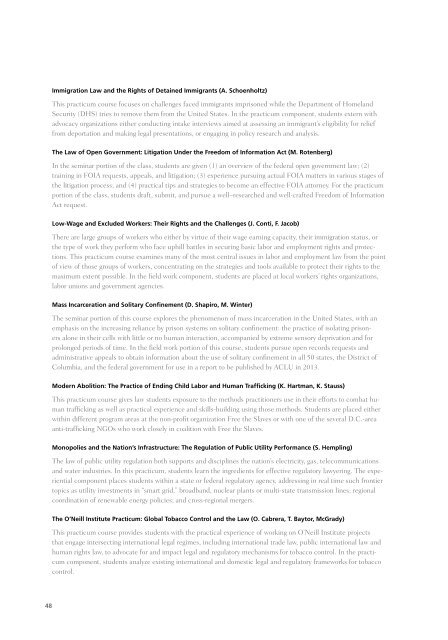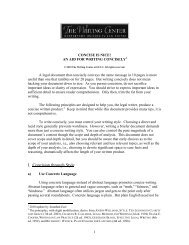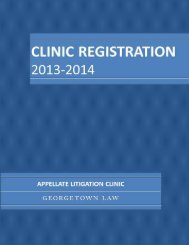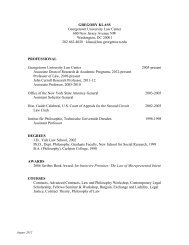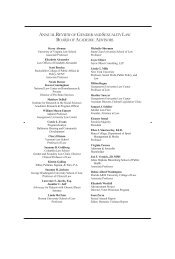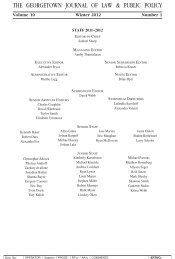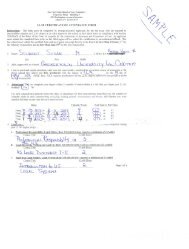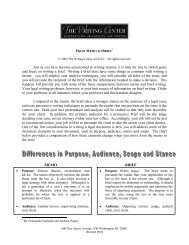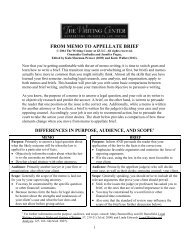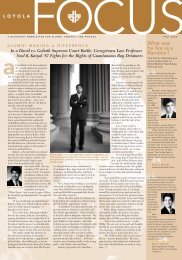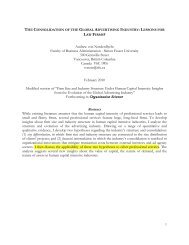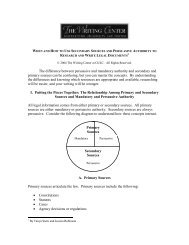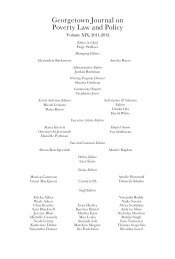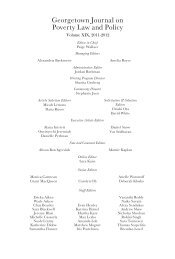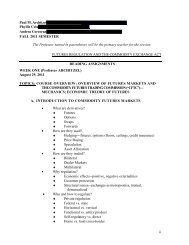experiential learning - Georgetown Law - Georgetown University
experiential learning - Georgetown Law - Georgetown University
experiential learning - Georgetown Law - Georgetown University
You also want an ePaper? Increase the reach of your titles
YUMPU automatically turns print PDFs into web optimized ePapers that Google loves.
48<br />
Immigration <strong>Law</strong> and the Rights of Detained Immigrants (A. Schoenholtz)<br />
This practicum course focuses on challenges faced immigrants imprisoned while the Department of Homeland<br />
Security (DHS) tries to remove them from the United States. In the practicum component, students extern with<br />
advocacy organizations either conducting intake interviews aimed at assessing an immigrant’s eligibility for relief<br />
from deportation and making legal presentations, or engaging in policy research and analysis.<br />
The <strong>Law</strong> of Open Government: Litigation Under the Freedom of Information Act (M. Rotenberg)<br />
In the seminar portion of the class, students are given (1) an overview of the federal open government law; (2)<br />
training in FOIA requests, appeals, and litigation; (3) experience pursuing actual FOIA matters in various stages of<br />
the litigation process; and (4) practical tips and strategies to become an effective FOIA attorney. For the practicum<br />
portion of the class, students draft, submit, and pursue a well–researched and well-crafted Freedom of Information<br />
Act request.<br />
Low-Wage and Excluded Workers: Their Rights and the Challenges (J. Conti, F. Jacob)<br />
There are large groups of workers who either by virtue of their wage earning capacity, their immigration status, or<br />
the type of work they perform who face uphill battles in securing basic labor and employment rights and protections.<br />
This practicum course examines many of the most central issues in labor and employment law from the point<br />
of view of those groups of workers, concentrating on the strategies and tools available to protect their rights to the<br />
maximum extent possible. In the field work component, students are placed at local workers’ rights organizations,<br />
labor unions and government agencies.<br />
Mass Incarceration and Solitary Confinement (D. Shapiro, M. Winter)<br />
The seminar portion of this course explores the phenomenon of mass incarceration in the United States, with an<br />
emphasis on the increasing reliance by prison systems on solitary confinement: the practice of isolating prisoners<br />
alone in their cells with little or no human interaction, accompanied by extreme sensory deprivation and for<br />
prolonged periods of time. In the field work portion of this course, students pursue open records requests and<br />
administrative appeals to obtain information about the use of solitary confinement in all 50 states, the District of<br />
Columbia, and the federal government for use in a report to be published by ACLU in 2013.<br />
Modern Abolition: The Practice of Ending Child Labor and Human Trafficking (K. Hartman, K. Stauss)<br />
This practicum course gives law students exposure to the methods practitioners use in their efforts to combat human<br />
trafficking as well as practical experience and skills-building using those methods. Students are placed either<br />
within different program areas at the non-profit organization Free the Slaves or with one of the several D.C.-area<br />
anti-trafficking NGOs who work closely in coalition with Free the Slaves.<br />
Monopolies and the Nation’s Infrastructure: The Regulation of Public Utility Performance (S. Hempling)<br />
The law of public utility regulation both supports and disciplines the nation’s electricity, gas, telecommunications<br />
and water industries. In this practicum, students learn the ingredients for effective regulatory lawyering. The <strong>experiential</strong><br />
component places students within a state or federal regulatory agency, addressing in real time such frontier<br />
topics as utility investments in “smart grid,” broadband, nuclear plants or multi-state transmission lines; regional<br />
coordination of renewable energy policies; and cross-regional mergers.<br />
The O’Neill Institute Practicum: Global Tobacco Control and the <strong>Law</strong> (O. Cabrera, T. Baytor, McGrady)<br />
This practicum course provides students with the practical experience of working on O’Neill Institute projects<br />
that engage intersecting international legal regimes, including international trade law, public international law and<br />
human rights law, to advocate for and impact legal and regulatory mechanisms for tobacco control. In the practicum<br />
component, students analyze existing international and domestic legal and regulatory frameworks for tobacco<br />
control.


